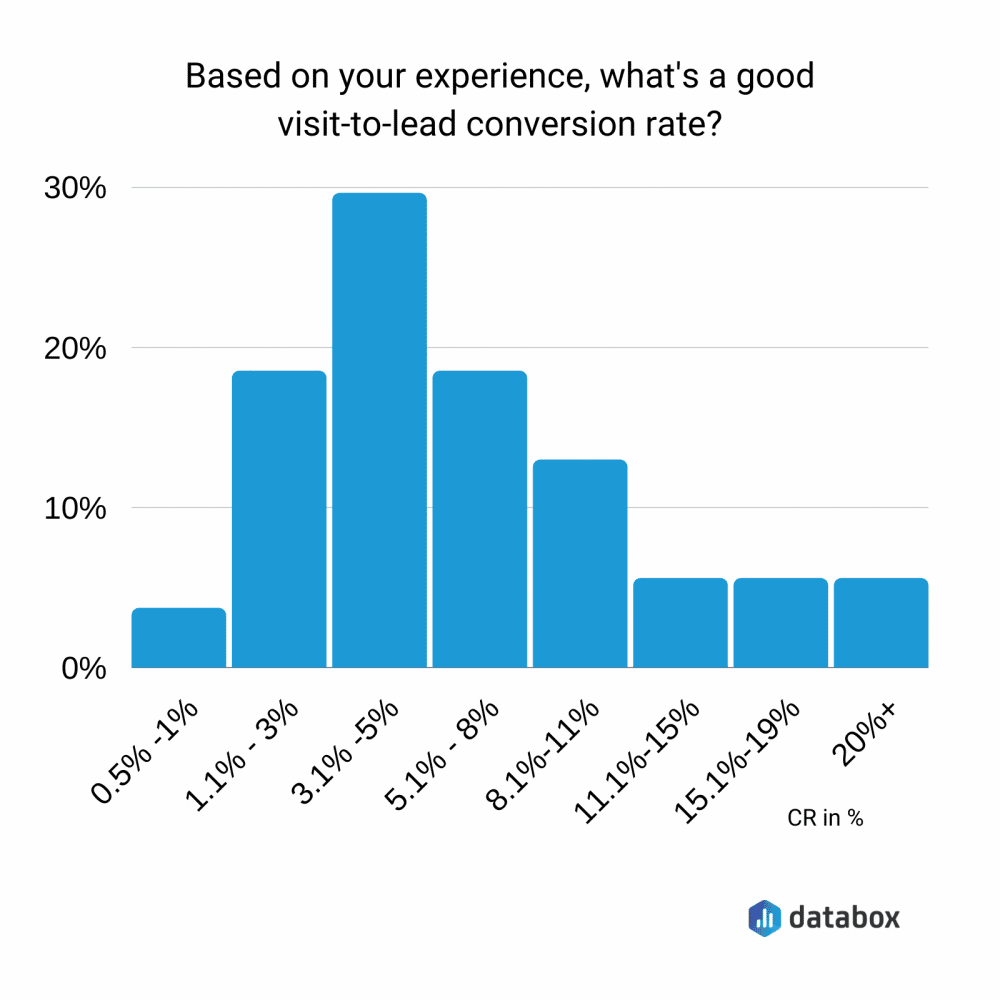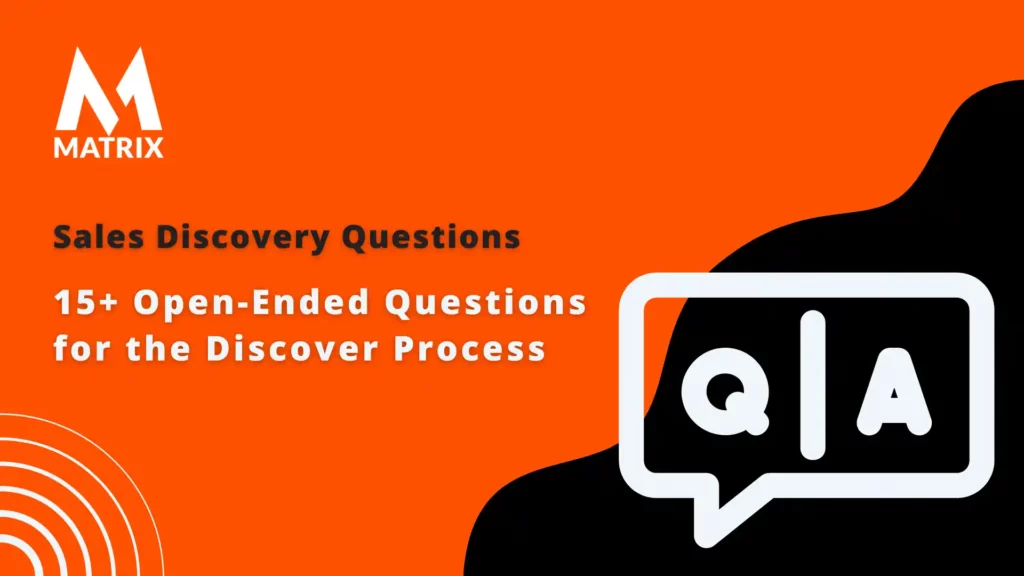Sales Discovery Questions: 15 Open-Ended Questions for the Discover Process
Learn about the Sales Discovery Questions: 15 Open-Ended Questions for the Discover Process to Help Close More Business
Do you need help to uncover valuable insights about potential customers in the financial industry? A successful sales discovery process is integral to creating marketing campaigns that truly resonate and are tailored to each customer.
To help marketers in the financial industry get started, we have outlined 15 open-ended questions that can be part of a comprehensive sales discovery process.
With this guide, you’ll have all the background information you need to gain crucial insights from your potential customers and craft better marketing strategies for your organization.
Have questions about the sales discovery process? Learn the top questions to ask on a discovery call.
The Sales Discovery Process and its Benefits for Financial Professionals

Effective sales discovery processes are essential components of success in the financial industry. Financial professionals can identify solutions that best meet their needs by asking open-ended questions to create rapport and gain trust with clients.
A well-crafted sales discovery process can also save time and resources as it provides a focused, strategic approach to seeking information. Adopting this process gives financial professionals a competitive advantage by increasing client satisfaction and loyalty due to tailored services.
Finally, the sales discovery process can build trust with prospective customers who support business development. The benefits of utilizing an effective sales discovery process for success in the financial industry are abundant.
What is an Open-Ended Question, and How Can it Help Your Sales Discussions?
Open-ended questions are an important part of any sales discovery process because they can provide invaluable insight into a customer’s needs and pain points.
These questions don’t simply elicit “yes/no” responses; instead, open-ended inquiries prompt customers to think about the topic more deeply and honestly. By understanding the financial industry through targeted open-ended questions, sales staff can better identify opportunities to create value for the customer and uncover areas that need improvement.
With an extensive collection of fifteen open-ended sales questions tailored to the financial industry, you can leverage deeper conversations with prospective customers, leading to improved results.
15 Open-Ended Questions to Ask During a Sales Discovery Process

The sales discovery process is a critical part of any successful sale. Gathering the necessary information from prospects enables sales professionals to identify their needs and craft a tailor-made solution that best aligns with their goals and objectives.
To do this, it’s important to ask a variety of open-ended questions during the sales discovery process relevant to the target market industry.
For instance, when selling to an organization in the financial sector, 15 effective open-ended questions could include probing into their risk profile, budget available for investments, a timeline of availability for certain services, or whether any existing technology is in place to the services being offered.
With a comprehensive list of these key questions, sales professionals can identify useful insights and create value with tailored solutions specific to their clients.
a. What are your top priorities every month for your business in terms of growth and success
Understanding the priorities of any business is extremely important to its continued success and growth. For companies in the financial sector, it is no exception.
By asking specific and targeted questions about their monthly objectives, we can assess precisely which strategies and tactics are necessary to meet those goals.
By delving into what is important for them to accomplish each month, we can provide tailored advice and custom solutions that help businesses reach new heights of success with greater efficiency.
Through properly implementing our 15 open-ended sales questions, businesses in this industry can confidently progress toward their long-term goals.
b. What challenges do you face when it comes to managing your finances, taxation, or investing
Managing finances, taxation, and investments can be challenging, especially in the turbulent personal finance industry. Keeping track of changes in regulations, market fluctuations, and unpredictable elements like taxes can feel like a full-time job – but without the right approach or support, it’s easy to fall behind in understanding the best ways to navigate these issues.
Clients can gain clarity and insight into their finances through this sales discovery process and its 15 open-ended questions tailored to the financial industry. This process helps guide them toward making informed decisions with greater confidence about their financial plans.
c. How does the current market environment affect your decisions about when to invest and where to allocate funds
The current market environment has surprised many and caused upheaval in industries worldwide.
Answering these 15 open-ended sales questions can help financial professionals better understand where the markets stand today, make informed decisions about when to invest, and decide on ideal locations for optimal earnings.
Additionally, investors should consult knowledgeable advisors to make sound investments using the latest market information. By preparing properly and considering the current environment, investors can position themselves for maximum return in this ever-changing world economy.
d. Are there any recent regulatory changes that have impacted your decision-making process
With the ever-evolving regulatory landscape in the financial industry, keeping up with new mandates and regulations can feel never-ending.
It’s important to ask clients if recent regulatory changes may have impacted their decision-making process.
This could be anything from changes to trading rules and regulations to adjustments in corporate governance or customer privacy practices. Knowing what new regulations might have affected a client’s organization can help you better inform them of potential solutions and products they may need to stay compliant.
e. Are there any specific areas of financial management that you are currently looking to improve
Financial management is key to the success of any business in the financial industry, so it is not surprising that many organizations are looking for ways to improve in this area. Quality financial management can be achieved through strategic initiatives and thoughtful investments.
One way to identify where those efforts should be directed is by understanding what areas employees and executives would like to see improved within their organization’s financial strategy. By asking open-ended questions about their goals and objectives, one can gain insight into where change may be necessary and how best to move forward as a collective team.
These are some of the top B2B sales questions that help you dig deeper into the pain points that are most important to the prospect, the triggers that led them to reach out to you, and whether or not they’re actively looking to purchase.
Best sales discovery questions
1. How did you hear about us?
Sales discovery questions type: Inbound leads
The trigger that made them look for a new solution.
2. What challenges you’re looking to solve?
Sales discovery questions type: Inbound
Top-of-mind issues that are most important to the prospect.
3. What’s your current process for dealing with issues like these?
Sales discovery questions type: Outbound
Identifies outdated or inefficient processes that can be improved.
4. What solution are you currently using to do that? What’s working/not working with that solution?
Discovery sales questions: Inbound or outbound
What they like and dislike about their current solution and whether that matches with what you’re offering.
5. What are your other options to fix this? Do you have a Plan B?
Sales discovery questions: Inbound
Whether or not there is an urgent need to purchase a solution.
6. What kind of results do you expect from a new solution?
Sales discovery questions type: Inbound or outbound
Key metrics that are important to the prospect and whether their expectations are realistic.
7. When would you expect to see those kinds of results?
Sales discovery questions type: Inbound or outbound
Timeline.
8. Why is this a priority for you?
Sales discovery questions type: Inbound
If the prospect is motivated to make a purchase decision now.
9. Why now? Why not last quarter or last year?
Sales discovery questions type: Inbound
The real, underlying reason the prospect is looking for a solution now.
10. What are the must-have features of a solution? What integrations can your team simply live with?
Sales discovery questions type: Inbound or outbound
Product fit based on features and integrations this prospect needs.
11. What other solutions are you looking at? Why those?
Sales type: Inbound or outbound
Competitors this prospect is considering, what they like or dislike about those options, and how those match up to your product.
6 Sales Discovery Call Questions That Highlight the Value of Your Solution
You know your solution is fantastic and will improve your prospect’s life—now you have to convince them.
Instead of giving a 30-minute spiel that may or may not is worth listening to, you can build trust in your product by allowing your prospects to convince themselves that they need it.
The key: ask probing questions that prove the worth of your product.
Help them put their challenges into numbers and understand exactly what kind of results your product will give them with discovery call questions like these:
12. If you don’t find a solution for [challenge they mentioned], what will [process] look like in 6 months?
Discovery Call Example: If you don’t find a solution to the high churn at the end of your sales process, what will your sales pipeline look like in 6 months?
Gets them to think about the challenges they’ll face down the road, not just today. This increases motivation to solve those challenges before they get worse.
13. How is this issue affecting the rest of your team?
Helps them consider the effect on others, not just themselves.
14. What’s the main metric your team uses to track success? What would be the effect on that metric if you found the right solution?
What it does for the prospect: Shows them how a key team metric can be improved and helps them think about the results for themselves and their team. (After all, improving a key metric is a good reflection on the team, not just the product.)
15. How much money would you be saving if you could solve [problem]?
Puts a dollar value on the problem.
Next Steps After Asking Questions during the Sales Discovery Process
After asking the necessary open-ended sales questions during the sales discovery process, the next step is to listen. By actively listening and engaging in dialogue with the customer, reps will better understand customer needs, wants, and motivations.
From here, reps can offer tailored solutions that drive customer success. Listening and understanding the customer’s needs make it easier for them to trust your organization, which is a key building block in any successful relationship.
Reps should recap their conversation to ensure a clear understanding between customer expectations and what your organization can provide. These steps will help your organization and customers confidently advance in any financial venture.
Concluding Thoughts on Leveraging Open-Ended Questions

Using open-ended questions in the financial industry can be a powerful tool to uncover customer needs, assess competitive threats, and gain insights into new market strategies. When used correctly, they can provide often overlooked information essential to making informed decisions.
However, it is important to note that open-ended questions should be used judiciously and thoughtfully, as they should complement the sales narrative, not distract from it. Ultimately, using well-crafted open-ended questions throughout the sales discovery process enables more meaningful connections with prospects and customers to understand their pain points and solutions better.
Sales discovery is invaluable for financial professionals, revealing important information about their clients to increase sales. Open-ended questions are paramount for understanding the landscape of your prospects and clients by uncovering their values, challenges, and goals.
With the 15 open-ended questions outlined in this article, financial professionals can craft a meaningful and thorough discussion with potential and existing clients to understand better how they can assist with achieving their long-term goals.
Remember the power of rapport building during any sales process; when your potential client opens up through actively engaged discussions, it will lead to trust and potentially more sales or referrals from that client.
Get your free SEO audit today if you want to use SEO services tailored specifically to financial enterprises. Armed with these tools, you’ll be able to approach each conversation prepared and full of insightful questions that–when framed correctly–will promote trust between yourself and the prospect or client.
General FAQs
What is Sales Discovery Process?
The sales Discovery Process is used to uncover customer needs, assess competitive threats, and gain insights into new market strategies. It involves asking open-ended questions about goals and objectives to identify areas that need improvement within the organization’s financial strategy.
How can open-ended questions be used effectively during the sales discovery process?
Open-ended questions should be used judiciously and thoughtfully, as they should complement the sales narrative rather than distract from it. Additionally, active listening during customer conversations helps reps better understand their needs, wants, and motivations before offering tailored solutions for customer success.
What are some tips for leveraging open-ended questions in the financial industry?
Leveraging well-crafted open-ended questions throughout the sales discovery process can enable meaningful connections with prospects or clients to understand better their pain points and potential solutions for business growth.
How can use HubSpot to shorten the sales cycle?
HubSpot provides various sales automation tools that make it easier for organizations to manage their prospects and customers. This includes automated emails, lead scoring, and workflow automation designed to help teams shorten the sales cycle by streamlining processes, eliminating repetitive tasks, and helping reps stay organized in managing customer data.

